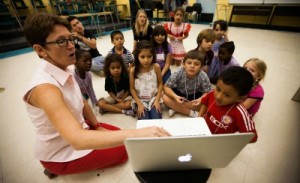By Cathy Benedict and Patrick Schmidt
Professors of music education, FIU School of Music
We are surrounded by music every day as it plays a significant role in our lives in many forms and settings. This understanding shapes the basic impetus of the music education research we are conducting with Miami teachers and children at the FIU School of Music. Our research is strengthened by the premise that music is a diverse practice, offering the opportunity to enrich the lives of whomever shows an interest and desire to participate.
Social change through music
El Sistema was founded by economist and musician José Antonio Abreu with the idea that social change could be achieved through musical excellence using an ensemble model of instruction. The program has been quite successful in Venezuela and in other countries (e.g., Scotland’s Big Noise). The Miami Music Project developed El Sistema Miami (ESMIA), which is now the second largest El Sistema-inspired program in the United States.
The FIU research collaboration with the Miami Music Project further demonstrates how music effectuates social change within communities. Using the El Sistema framework, the duo provides free music education to Miami youth. ESMIA involves 300 Miami-Dade Public School students, ages 4-18 in two under served immigrant communities with distinct predominantly Hispanic and Haitian populations. The students take music lessons alongside FIU students for one to three hours weekly.
The project aims to discover the extent to which participation in El Sistema enhances the lives of children who may be at risk for various socioeconomic reasons. The children have embraced the process and each week we observe how they come to see themselves and their musical abilities differently and with higher esteem. Students grapple with technicalities along the way as musical challenges become progressively more sophisticated. We see confidence and self esteem bloom as students interact with, and support one another. For some, victory comes when technical issues are addressed and conquered, while for others it comes as they stand to sing alone with comfort and certainty.
This research is critical in guiding further implementation of these programs nationally and internationally, as well as further developing public policy of music education programs within public school settings.
Making sense of the world
Today’s challenge for music educators is to convey to society a larger picture of the role music already plays in our lives on a daily basis. If we recognize that music brings together cognitive, kinesthetic, aesthetic, cultural and social forms of thinking, we must also recognize that music and music education is experienced not only within school classrooms or concert halls, but also in homes, communities, places of worship and even work.
Most significantly, understanding music in different environments helps us to deduce how learning is fostered through musical experiences and how music helps us make sense of the world. This has many implications for how we facilitate musical encounters in our schools.
“Musicing” in public schools
Music education is an integral part of many Miami Dade Public Schools curricula however, many elementary schools have eliminated requirements for music before second grade. Consequently, music instruction at elementary grade level often becomes the responsibility of general educators. Although the FIU College of Education students are mandated to take a course to prepare them to teach and integrate music in younger grades, we have little analysis on the impact of such instruction on teachers.
Another aspect and goal of our research is to have a better understanding of teacher perceptions, dispositions and continued practices in implementing musical engagements in the “regular” classroom. A better understanding of how to incorporate music in their teaching can have an impact on student learning and facilitate more diverse teaching practices that address different learning styles, different intelligences and enable the higher-level thinking that is fostered by artistic engagement.
What we hope to accomplish beyond the joy of making music (or “musicing”) with these diverse groups, is self transformation as we engage with others. Engaging in research helps to focus these issues.




